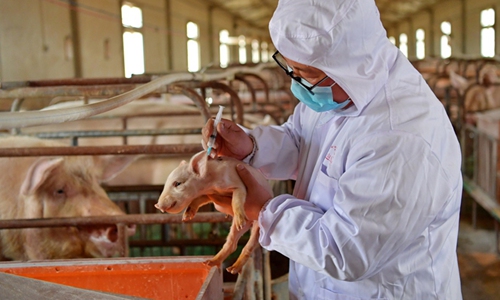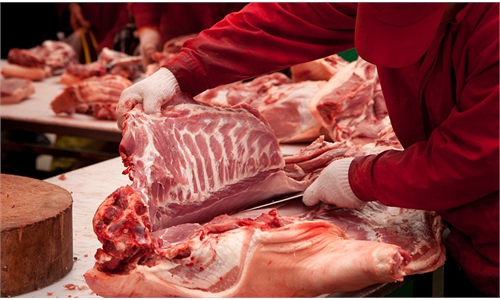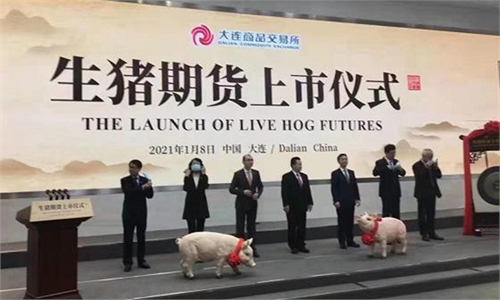
An owner of a hog farm in Qiongjie county, Shannan, Tibet autonomous region, vaccinates a piglet on April 21, 2020. Photo:Xinhua
A Chinese official on Wednesday sought to allay rising concerns over reported sharp declines in the domestic pig breeding industry and overreliance on foreign supply, saying that China has cut reliance on foreign imports as local supply is guaranteed.
China now imports fewer than 10,000 breeding pigs a year, accounting for less than 10 percent of the total herd, Chen Yaosheng, chief scientist of the State Swine Reproduction System Project, said at a press conference held by the Ministry of Agriculture and Rural Affairs on Wednesday.
"China has been engaged in localized breeding of lean meat pigs, including such breeds as duroc, landrace and large white, since the 1980s, which has ensured nearly 90 percent of the pigs needed for the domestic market," Chen said, adding that the small number of imported breeding pigs are used for replenishing herds, updating the herd's lineage and improving breeding outcomes.
He said that the country's systematic breeding pig selection work started about 50 years later than in developed countries, so China lags 10-30 percent behind advanced countries in key metrics such as the size of the core breeding population and the feed conversion rate.
Chen's remarks came after some in the country raised concerns of overreliance on foreign supplies for such a crucial item that could potentially affect China's food security.
Some domestic media reports have claimed that the market share of locally bred pigs has plunged to 2 percent from 90 percent at the peak, with most of the pork on the market being from foreign pigs.
"A modest number of breeding pig imports helps the domestic breeding pig sector catch up with those countries," Chen explained, noting that this is an international common practice.
There are 83 types of local breeding pigs in China that produce meat with good quality and flavor, but they can't meet consumers' growing demand for lean meat. Such pigs are also unsuited to modern modes of production because they eat more, grow more slowly and produce less lean meat, Chen said.
As a result, fewer breeders are raising such pigs.
But the country has established 62 national-level conservation farms to protect local breeds, and it has cultivated 30 new types of pigs, he said. The ministry on Wednesday also revealed a plan for livestock and poultry genetic improvement during the 2021-2035 period.
It aims to build a commercialized breeding system to improve the productivity and quality of breeding birds and animals, and to independently nurture competitive genetic materials to ensure a self-reliant supply of core breeding birds and animals in 10-15 years.
Sun Haoqin, deputy director general of the seed management department of the ministry, said at the conference that after the first round of the genetic improvement project spanning from 2008 to 2020, the country's self-supply of core animal genetic material had exceeded 75 percent.



